| Volvo S80 | |
|---|---|
_%E2%80%93_Frontansicht%252C_26._Oktober_2012%252C_D%C3%BCsseldorf.jpg.webp) 2012 Volvo S80 (DE) | |
| Overview | |
| Manufacturer | Volvo Cars |
| Production | |
| Body and chassis | |
| Class | Mid-size luxury / Executive car (E) |
| Body style | 4-door saloon |
| Layout | |
| Chronology | |
| Predecessor | Volvo 940 / Volvo 960 / Volvo S90 Sedan Ford Scorpio[1] |
| Successor | Volvo S90 II[2] |
The Volvo S80 is an executive car produced by the Swedish manufacturer Volvo Cars from 1998 to 2016 across two generations. It took the place of the rear-wheel-drive S90 as Volvo's flagship sedan.
The first generation (1998–2006) was made available for the 1999 model year. It has since been built at the Torslanda Works in Gothenburg, Sweden, with a few 1999 model year cars for the North American market built at Volvo's Halifax Assembly plant. Unlike most Volvo models, it did not have a station wagon version for its first generation.
The second generation (2006–2016) was released in 2006 as a model year 2007 car. It has an estate version, the third generation of the Volvo V70. In June 2007, the S80 scored the highest "good" rating in the Insurance Institute for Highway Safety (IIHS) crash test performance for frontal, side, and rear impacts,[3] earning it the IIHS Top Safety Pick.
The model was replaced by the second generation S90 in the later half of 2016.
First generation (1998–2006)
| First generation | |
|---|---|
 2004 Volvo S80 (US) | |
| Overview | |
| Production | 1998–2006 |
| Model years | 1999–2006[4] |
| Assembly | |
| Designer |
|
| Body and chassis | |
| Layout | Front-engine, front-wheel-drive Front-engine, all-wheel-drive |
| Platform | Volvo P2 platform[6] |
| Related | |
| Powertrain | |
| Engine | |
| Transmission |
|
| Dimensions | |
| Wheelbase | 2,791 mm (109.9 in) |
| Length |
|
| Width | 1,831 mm (72.1 in) |
| Height | 1,435 mm (56.5 in) |
| Kerb weight | 1,605–1,712 kg (3,538–3,774 lb)[8][9][10][11] |
The design takes styling cues from the Volvo ECC concept. The first-generation S80 is based on the Volvo P2 platform. Over 368,000 first-generation S80s were built.[12] The S80 featured a straight-six engine in a transverse engine mounting. No existing manual gearbox would fit in the engine bay with the six-cylinder engine, so Volvo had to develop their own, the M65. It featured also an environmental specification, covering aspects such as allergens from textiles, fuel economy and the life cycle of the car from production to dismantling.[13][14]
Volvo continued its safety tradition, offering front and rear integrated crumple zones, driver and front passenger dual threshold airbags with a collapsible three-stage steering column, Side Impact Protection System (SIPS) supplemented with air bags for driver and front passenger, along with a side curtain airbag for front and rear passengers, anti-submarine seats, five padded head restraints with Whiplash Protection System (WHIPS), and automatic seat belt pretensioners while front belts also have height adjustment.[14][15][16][17]
The S80 was initially available with four different engines. Starting the range was a detuned 2.4-litre 104 kW (141 PS; 139 bhp) five-cylinder. This was also available as a compressed natural gas (CNG) and as a liquefied petroleum gas (LPG) version. The fully tuned version produced 125 kW (170 PS; 168 bhp). Next up was a 2.9-litre 144 kW (196 PS; 193 bhp) six-cylinder, then 200 kW (272 PS; 268 bhp) T6, and finally, the 103 kW (140 PS; 138 bhp) 2.5-litre Volkswagen-sourced Turbocharged Direct Injection (TDI) diesel engine. The 2.9 has a straight-six engine, while the T6 was powered by a de-bored twin-turbocharged version.[17] The S80 used CAN bus multiplexing wiring to simplify the various electronic components and safety systems and linking the various ECU to save complexity and weight.[18]
In 2000, there was the addition of the 149 kW (203 PS; 200 bhp) 2.5T, available with standard all-wheel drive. The 2.5T model featured a light-pressure turbocharger. and addition of the 149 kW (203 PS; 200 bhp) 2.3T, available in Thailand Version. Late 2001 introduced the 120 kW (163 PS; 161 bhp) five-cylinder common rail diesel D5, detuned to 96 kW (131 PS; 129 bhp) and sold as 2.4D in some markets.[7][19] In some European countries, the entry level S80 came with a 2.0-litre five-cylinder turbocharged engine producing 182 PS (134 kW; 180 bhp) and a T5 badged S80 with the same engine but tuned to 226 PS (166 kW; 223 bhp) with the help of the Mitsubishi TD04-16t high pressure turbo also found in the early S60 T5s. These were sold in countries such as Portugal where larger capacity engines were penalized by heavy taxes.
In 2004 PremAir was introduced as a standard feature to the exterior radiator surface which converts up to 75 percent of ground level ozone in the radiator cooling air into oxygen, while the Interior Air Quality System cleans the air inside, detects for pollutants and automatically recirculates in comparison to the air outside.[14] The upholstery was available in taupe, light sand or graphite and the leathers were tanned using natural plant materials. The S80 sheet metal content can be recycled, along with other metals that achieved an 85 overall percentage.[14] Dual zone climate control and heated front seats along with a three position drivers memory setting were optional, and anti-smash and grab laminated side windows were available. Retractable sunshades for the rear side door windows and an electronically extendable rear window sunshade were available[14]
The S80 came standard with Volvo's own radio unit, the HU-613, the HU-803 and was later upgraded to the HU-650 and an optional extra HU-850 unit. The HU-850 unit features a 225 or 335-watt power output (depending on optional external amplifier) with three presets: 2CH, 3CH and Dolby Digital Pro Logic II Surround Sound. The Four-C electronically modified suspension became an option on some S80s.[14][15][16]
Minor exterior design changes occurred between 2003 and 2004 versions, and in 2005 the Haldex-sourced AWD was available with the 2.5-litre five-cylinder turbo.[15] In 2006 The AWD system was upgraded with a pre-charged, electronically controlled all-wheel drive system called Instant Traction, which consisted of constant hydraulic pressure that would divide available traction to the wheels as needed.[16]
_01.jpg.webp) 1998 Volvo S80 pre-facelift (AU)
1998 Volvo S80 pre-facelift (AU)_02.jpg.webp) 1998 Volvo S80 pre-facelift (AU)
1998 Volvo S80 pre-facelift (AU)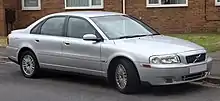 2004 Volvo S80 post facelift (UK)
2004 Volvo S80 post facelift (UK) 2004 Volvo S80 post facelift (UK)
2004 Volvo S80 post facelift (UK)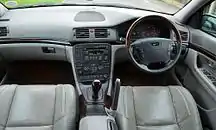 Pre-facelift interior (UK)
Pre-facelift interior (UK)
Engines
| Model | Engine code | Year(s) | Power at rpm | Torque at rpm | Displacement | Engine configuration | Fuel Consumption (l/100km) |
|---|---|---|---|---|---|---|---|
| 2.4 | B5244S2[20] | 1998–2006 | 103 kW (140 PS; 138 bhp) at 4500 | 220 N⋅m (162 lb⋅ft) at 3300 | 2,435 cc (148.6 cu in) | Straight five | City: 12.3 Open road: 6.9 Combined:8.9 |
| 2.4i | B5244S | 1998–2006 | 125 kW (170 PS; 168 bhp) at 6000 | 225 N⋅m (166 lb⋅ft) at 4500 | Straight five | City: 12.3 Open road: 7 Combined: 8.4 | |
| 2.0T | B5204T5 | 2000–2006 | 120 kW (163 PS; 161 bhp) at 5100 | 230 N⋅m (170 lb⋅ft) at 1800-5000 | 1,984 cc (121.1 cu in) | Straight five LPT | City: 12.5 Open road: 7.4 Combined: 9.4 |
| 2.3T | B5234T7 | 2000–2004 | 147 kW (200 PS; 197 bhp) at 5000 | 285 N⋅m (210 lb⋅ft) at 2000–5000 | 2,319 cc (141.5 cu in) | Straight five LPT | City: Open road: Combined: |
| 2.4T | B5244T3 | 2001–2003 | 147 kW (200 PS; 197 bhp) at 6000 | 285 N⋅m (210 lb⋅ft) at 1800–5000 | 2,435 cc (148.6 cu in) | Straight five LPT | City: 12.8 Open road: 7.2 Combined: 9.3 |
| 2.5T | B5254T2 | 2003–2006 | 154 kW (210 PS; 207 bhp) at 5000 | 320 N⋅m (236 lb⋅ft) at 1500–4500 | 2,521 cc (153.8 cu in) | Straight five LPT | City: 12.3 Open road: 6.8 Combined: 9.3 |
| 2.9 | B6294S | 1998–2001 | 147 kW (200 PS; 197 bhp) | 280 N⋅m (207 lb⋅ft) at | 2,922 cc (178.3 cu in) | Straight six | City: 15.3 Open road: 7.6 Combined: 10.4 |
| 2.9 | B6294S2 | 2001–2004 | 144 kW (196 PS; 193 bhp) at 5200 | 280 N⋅m (207 lb⋅ft) at 3900 | Straight six | City: 15.2 Open road: 8.4 Combined: 10.9 | |
| T6 | B6284T | 1998–2001 | 200 kW (272 PS; 268 bhp) | 380 N⋅m (280 lb⋅ft) at 2000–5000 | 2,783 cc (169.8 cu in) | Straight six twin-turbo | City: 16.6 Open road: 8.2 Combined: 11.3 |
| T6 | B6294T | 2002–2006 | 200 kW (272 PS; 268 bhp) at 5200 | 380 N⋅m (280 lb⋅ft) at 1800–5000 | 2,922 cc (178.3 cu in) | Straight six twin-turbo | City: 16 Open road: 8.3 Combined: 11.1 |
| Model | Engine code | Year(s) | Power at rpm | Torque at rpm | Displacement | Engine configuration | Fuel Consumpton (l/100km) |
|---|---|---|---|---|---|---|---|
| 2.5 TDI* | D5252T (MSA 15.8) | 1998–2001 | 140 PS (103 kW; 138 bhp) at 4000 | 290 N⋅m (214 lb⋅ft) at 1900 | 2,461 cc (150.2 cu in) | Straight five turbocharged | City: 8.8 Open road: 4.9 Combined: 6.4 |
| 2.4D | D5244T2 | 2001–2006 | 130 PS (96 kW; 128 hp) at 4000 | 280 N⋅m (207 lb⋅ft) at 1750–3000 | 2,401 cc (146.5 cu in) | Straight five turbocharged common rail | City: 8.8 Open road: 5.1 Combined: 6.5 |
| D5 | D5244T | 2001–2006 | 163 PS (120 kW; 161 hp) at 4000 | 340 N⋅m (251 lb⋅ft) at 1750–3000 | City: 9 Open road: 5.1 Combined: 6.5 |
- *Volvo used a modified version of the 2.5 TDI VAG engine
Safety
Euro NCAP tested the first generation Volvo S80, running from 1998 to 2003. They tested a left-hand drive, 4-door saloon, registered in 2000, with front seatbelt pretensioners, seatbelt load limiters, as well as front, side, body, and head airbags:
| Test | Score | Points |
| Overall: | N/A | N/A |
| Adult occupant: | 29 | |
| Pedestrian: | 14 |
Scores given for the car showed pedestrians' legs facing a very aggressive front end, resulting in only 2 stars of 4 for pedestrian safety. Despite this Euro NCAP did state "This large Volvo is very safe and gave a good all-round performance" due to the good adult protection inside the car in the event of a collision.[21]
Second generation (2006–2016)
| Second generation | |
|---|---|
 Volvo S80 3.2 pre-facelift (US) | |
| Overview | |
| Production | 2006–2016 |
| Model years | 2007–2016 |
| Assembly | |
| Designer | Todd Levy (2004)[23][24] |
| Body and chassis | |
| Platform | Volvo P3 platform[25][26] |
| Related | |
| Powertrain | |
| Engine |
|
| Transmission |
|
| Dimensions | |
| Wheelbase |
|
| Length |
|
| Width | 1,861 mm (73.3 in) |
| Height | 1,490 mm (58.7 in) |
| Kerb weight | 1,565–1,860 kg (3,450–4,101 lb)[29][30][31] |
The second generation S80 was unveiled at the 2006 Geneva Motor Show[32] on 28 February, with sales beginning in June 2006. The new S80 features a new 3.2-litre straight-six engine or 4.4-litre V8 engine, in combination with available four-wheel drive. The second-generation S80 is the first Volvo saloon model to become available with Volvo's compact, transversely fitted B8444S V8 with a power output of 315 PS (232 kW; 311 hp) and 440 N⋅m (325 lbf⋅ft) of torque developed jointly by Volvo Cars engine unit Skövde and Yamaha, but built by Yamaha of Japan. The engine features four catalytic converters and advanced electronics. The structure featured high strength boron steel for safety.
The second generation S80 received the IIHS 2007 Top Safety Pick Award in overall safety protection. Also again in November the IIHS awarded the 2008 Volvo S80 with Top Safety Award.
The new S80 is based on the Volvo P3 platform, also used for vehicles including the Ford S-Max, third generation Ford Mondeo, and Ford Galaxy large MPVs.[33] Volvo's Personal Car Communicator (PCC) remote control will also be an optional feature with the new S80.
The S80 is available with optional adaptive cruise control (ACC) with collision warning with auto brake (CWAB). Brake support offers additional assistance by preparing the braking system so that the car can begin stopping faster and preparing for panic brake application. S80 is also equipped with an adaptive brake light as standard which is active at speeds above 30 mph (48 km/h), and can sense the difference between normal and panic braking. Ready alert brakes (RAB) are also available to anticipate severe braking. It prepares for this by moving the brake pads closer to the discs.
The S80 is available with a Blind Spot Information System as well as Lane Departure Warning, it can be turned on from 40 mph (64 km/h).
The T4 variant features the 1.6L turbocharged EcoBoost engine and is exclusively available in Asia and parts of Europe.
Second generation models
S80
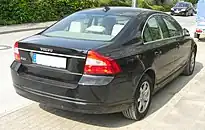 Volvo S80 pre-facelift (DE)
Volvo S80 pre-facelift (DE)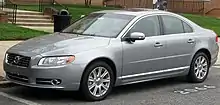 Volvo S80 post first-facelift (US)
Volvo S80 post first-facelift (US).JPG.webp) Volvo S80 post second-facelift (UK)
Volvo S80 post second-facelift (UK)
S80L
The S80L is a long-wheelbase variant designed and sold only in China. Wheelbase and overall length have been increased by 14 cm.[34] The 2011 version has a wheelbase of 2,975 mm (117.1 in) and is powered by a turbocharged 2.0 or 3.0L engine.[35] The S80L is one of two Volvo models produced under a joint-venture with Changan Ford Mazda Automobile (CFMA).[36][22] CFMA production of the S80L commenced in 2009 and ceased in late 2015 when the joint-venture ended.[22] The S80L has since been succeeded by the S90L.
 Volvo S80L (CN)
Volvo S80L (CN)
2010 update
New features for 2010 include a choice of five-cylinder 2.4-litre D5 twin-turbo diesel, 2.4-litre diesel, or 1.6-litre diesel engine. Also the 2.5T and 2.5FT were modified to produce more power and have a lower fuel consumption. The update marked the last year of the Yamaha-based V8 engine. An option was added for California on the 3.2L Inline-6 to meet PZEV emissions standards. It had 225 bhp, 10 less than the non-PZEV engine.[37] The car's exterior was modified to give the S80 a lower, longer and wider stance. More chrome trim was added to the front, the rear end, and the doors to look like the S80 Executive. The 2010 Volvo S80 facelift also comes with a choice between a comfort-enhancing standard chassis, or a sport one that offers better handling dynamics. The 2010 S80 will be available with a S80 R-design interior package to give the inside a sportier look. The interior package contains a new sports steering wheel, sports pedals, Dynamic leather seats, sports gearshift knob, and a new instrument with blue background.
The car was unveiled in 2009 at the Geneva Motor Show.[38]
2011
The 2011 Volvo S80 lineup now includes the Inscription Package. Features Include: Sovereign Hide leather seats, high gloss walnut wood inlays, and special trim. The 3.2L was re-tuned, power and engine speed differ. The Dynaudio Premium Sound option is downgraded to 'Premium Sound'.[39]
2012
The 2012 Volvo S80 now features a new 7-inch Sensus infotainment system in the center of the dash, genuine wood interior trim and Bluetooth audio streaming. Volvo's City Safety technology is also now standard. Premier Plus and Platinum trims are added for the 2012 model year.[40]
2013 update
The 2013 Volvo S80 now features standard headlight washers, rain sensing wipers, and push button start ignition. The Premium Plus edition adds xenon headlamps.
2014 update
The 2nd half of year 2014 introduced a new facelift with new front and rear bumpers, new lower front fascia, new grille style, the 7-inch infotainment system becomes standard, City Safety becomes standard, new optional digital gauge cluster, and additional interior ambient lighting.
2015
The base 2015 Volvo S80 is powered by a new turbocharged 2.0-liter four-cylinder engine with 240 horsepower, which is the same output as the 3.2-liter six-cylinder in the 2014 model. A new eight-speed automatic transmission comes standard, and the base S80 also gets a new auto start/stop feature, which turns the engine off when the car is stopped to conserve fuel. The 2015 S80 achieves an EPA-estimated 25/37 mpg city/highway, which is a notable improvement over the 2014 model's 20/29 mpg rating. T6 AWD models come with a turbocharged 3.0-liter six-cylinder engine that produces 300 horsepower. A six-speed automatic transmission and all-wheel drive are also standard on T6 models. The T6 gets slightly better fuel economy than the 2014 model T6.
An optional climate package includes heated front and rear seats, a heated windshield and a heated steering wheel. The 2015 Volvo S80 went on sale in early 2014 and starts at $40,500 in the US.
2015.5
Introduced in late 2014, midyear changes introduced for the 2015.5 model include new standard Sensus Connect and Volvo On-Call with 6-month complimentary subscriptions, new Sensus Navigation with Map Care, and a new optional Harman/Kardon Premium Sound System. Most notably, the new 2015.5 model has significantly better fuel economy due to the more efficient "Drive-E" engine, new 8-speed "Geartronic" automatic transmission, and new ECO+ functionality with modified Start/Stop technology, ECO-coast and ECO-climate. The 2015.5 Volvo S80 starts at $41,450 in the US.
2016
The Volvo S80 offered an expanded array of standard features for 2016 which includes heated front seats, Interior Air Quality System (IAQS), power glass sunroof, and 18-inch "Magni" alloy wheels. The S80 T5 Drive-E Platinum trim gains Volvo's Blind Spot Information System (BLIS) as standard. New S80 options include a wood steering wheel and 19-inch "Bor" alloy wheels with a lowered Sport Chassis. The T6 six-cylinder engine and all-wheel-drive model have been discontinued for the 2016 model year. The 2016 Volvo S80 T5 FWD Drive-E started at $43,450 in the US. 2016 was the last model year for the S80. The S80s successor, the S90, was unveiled at the Detroit Auto Show in January 2016.[41]
Engines
| Model | Engine code | Year(s) | Power | Torque at rpm | Displacement | Engine configuration! |
|---|---|---|---|---|---|---|
| 2.0 | B4204S3 | 2007–2010 | 107 kW (145 PS; 143 bhp) at 6000 | 190 N⋅m (140 lb⋅ft) at 4500 | 1,999 cc (122.0 cu in) | Inline-four |
| 2.0F | B4204S4 | 2007–2010 | 107 kW (145 PS; 143 bhp) at 6000 | 190 N⋅m (140 lb⋅ft) at 4500 | Inline-four Flexifuel | |
| 2.0T | B4204T6 | 2010-2011 | 149 kW (203 PS; 200 bhp) at 6000 | 300 N⋅m (220 lb⋅ft) at 1750-4000 | Inline-four with turbocharger | |
| 2.5T | B5254T6 | 2006–2009 | 147 kW (200 PS; 197 bhp) at 4800 | 300 N⋅m (221 lb⋅ft) at 1500–4500 | 2,521 cc (153.8 cu in) | Inline-five LPT |
| 2.5FT | B5254T8 | 2008–2009 | 147 kW (200 PS; 197 bhp) at 4800 | 300 N⋅m (221 lb⋅ft) at 1500-4500 | Inline-five LPT Flexifuel | |
| 2.5T | B5254T10 | 2009–2010 | 170 kW (231 PS; 228 bhp) at 4800 | 340 N⋅m (251 lb⋅ft) at 1700–4800 | Inline-five LPT | |
| 2.5FT | B5254T11 | 2009–2010 | 170 kW (231 PS; 228 bhp) at 4800 | 340 N⋅m (251 lb⋅ft) at 1700-4800 | Inline-five LPT Flexifuel | |
| B6324S[42] | 2006–2010 | 175 kW (238 PS; 235 bhp) at 6200 | 320 N⋅m (236 lb⋅ft) at 3200 | 3,192 cc (194.8 cu in) | Inline-six |
| 3.2 | B6324S5 | 2011 | 179 kW (243PS; 240 bhp) at 6400 | 320 N⋅m (236 lb⋅ft) at 3200 | Inline-six | |
| 3.2 PZEV | B6324S2 | 2010 | 168 kW (228PS; 225 bhp) at 6200 | 300 N⋅m (221 lb⋅ft) at 3400 | Inline-six | |
| 3.2 PZEV | B6324S4 | 2011 | 171 kW (233PS; 230 bhp) at 6500 | 300 N⋅m (221 lb⋅ft) at 3300 | Inline-six | |
| T4 | B4164T | 2011–2016 | 134 kW (182 PS; 180 bhp) | 240 N⋅m (177 lb⋅ft) at | 1,596 cc (97.4 cu in) | Inline-four turbocharged |
| T5 | B4204T7 | 2013–2016 | 180 kW (245 PS; 241 bhp) | 350 N⋅m (258 lb⋅ft) at | 1,969 cc (120.2 cu in) | Inline-four turbocharged |
| T5 | B4204T11 | 2014–2016 | 180 kW (245 PS; 241 bhp) | 350 N⋅m (258 lb⋅ft) at | Inline-four turbocharged | |
| T6 AWD | B6304T2 | 2008–2010 | 209.5 kW (285 PS; 281 bhp) | 400 N⋅m (295 lb⋅ft) at 1500–4800 | 2,953 cc (180.2 cu in) | Inline-six turbocharged |
| T6 AWD | B6304T4 | 2010–2014 | 224 kW (305 PS; 300 bhp) | 440 N⋅m (325 lb⋅ft) at | Inline-six turbocharged | |
| B8444S | 2006–2010 | 232 kW (315 PS; 311 bhp) | 440 N⋅m (325 lb⋅ft) at 3950 | 4,414 cc (269.4 cu in) | V8 |
| Model | Engine Code | Year(s) | Power | Torque at rpm | Displacement | Engine configuration! | |
|---|---|---|---|---|---|---|---|
| 1.6D DRIVe | D4164T | 2009– | 80 kW (109 PS; 107 bhp) | 240 N⋅m (177 lb⋅ft) at 1750[44] | 1,560 cc (95.2 cu in) | Inline-four turbocharged common rail | |
| 2.0D | D4204T | 2008– | 100 kW (136 PS; 134 bhp) | 320 N⋅m (236 lb⋅ft) at 2000[44] | 1,997 cc (121.9 cu in) | Inline-four turbocharged common rail | |
| 2.4D | D5244T5 | 2006–2009 | 120 kW (163 PS; 161 bhp) | 340 N⋅m (251 lb⋅ft) at | 2,400 cc (146.5 cu in) | Inline-five turbocharged common rail | |
| 2.4D | D5244T14 | 2009– | 129 kW (175 PS; 173 bhp) | 420 N⋅m (310 lb⋅ft) at 1500–2750[44] | Inline-five turbocharged common rail | ||
| D4 | D5204T3[45] | −2014 | 120 kW (163 PS; 161 bhp) | 400 N⋅m (295 lb⋅ft) at | 1,984 cc (121.1 cu in) | Inline-five turbocharged common rail | |
| D4 | D4204T5[45] | 2014–2016 | 133 kW (181 PS; 178 bhp) | 400 N⋅m (295 lb⋅ft) at | 1,969 cc (120.2 cu in) | Inline-four turbocharged common rail | |
| D5244T4 | 2006–2009 | 136 kW (185 PS; 182 bhp) | 400 N⋅m (295 lb⋅ft) at | 2,400 cc (146.5 cu in) | Inline-five turbocharged common rail | |
| D5244T10 | 2009–2010 | 151 kW (205 PS; 202 bhp) | 420 N⋅m (310 lb⋅ft) at 1500–3250 | Inline-five twin-turbo common rail | ||
| D5244TX | 201X–201X | 158 kW (215 PS; 212 bhp) | 420 N⋅m (310 lb⋅ft) at | Inline-five twin-turbo common rail |
Safety
| Moderate overlap frontal offset | Good |
| Small overlap frontal offset | Good1 |
| Side impact | Good |
| Roof strength | Good2 |
- 1 vehicle structure rated "Good"
- 2 strength-to-weight ratio: 4.26
Special versions
The S80 is also used as a base for specialised cars such as lengthened limousines, hearses,[47] and ambulances.[48][49] One company producing such models is Nilsson Special Vehicles, based in Laholm, Sweden. Ambulance models receive a completely new body from behind the b-pillar as well as a raised roof. A sliding side door is installed on the right hand side (sometimes on both sides) and the tailgate is enlarged to allow easier access. Nilsson only manufactured ambulances based on the first generation S80. Nilsson has built limousines[50] and hearses[51] based on both generations of the S80.[52] They also manufacture the official state car for a few heads of state, including for the King of Sweden and the King of the Netherlands.[53]
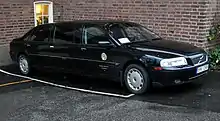 Stretched first generation S80 with six doors (SE)
Stretched first generation S80 with six doors (SE) Stretched first generation S80 with four doors (SE)
Stretched first generation S80 with four doors (SE)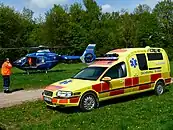 First generation S80 ambulance (CZ)
First generation S80 ambulance (CZ) First generation S80 ambulance, RHD model (UK)
First generation S80 ambulance, RHD model (UK)
Armored versions were also available. The first generation could be ordered from the factory, with the actual armoring done by an outside company. The second generation armoured version was available from Czech specialists SVOS and no factory armoring was offered.
See also
References
- ↑ The Ford Scorpio was Ford Europe's largest executive car before they bought Jaguar and Volvo and the Scorpio was forcibly succeeded by newer models produced by these companies, leading to Ford ending the production of executive cars under their own badge
- ↑ "New Volvo S90 2016 pricing announced". www.autocar.co.uk. AutoCar. 12 January 2016. Archived from the original on 4 December 2015. Retrieved 30 September 2017.
- ↑ "IIHS S80 Report". www.iihs.org. Iihs. 1 September 2010. Archived from the original on 5 November 2010. Retrieved 9 October 2010.
- 1 2 3 "SB-10037893-7638" (PDF). static.nhtsa.gov (SB). Volvo Car Corporation. 4 October 2012. pp. 4–5. Archived (PDF) from the original on 2 January 2018. Retrieved 30 January 2018.
- ↑ "The Volvo S80 combines innovative design, leading safety in world terms and a high technology level" (PDF). www.volvoclub.org.uk. Volvo Car Corporation. 1998. p. 8. Archived (PDF) from the original on 30 January 2018. Retrieved 13 December 2017.
- ↑ "Volvo S80. Ultra Modern Process With New Sophisticated Electrical System : Press release". volvoclub.org.uk. Volvo Car Corporation. 1998. Archived from the original on 30 January 2018. Retrieved 13 December 2017.
- 1 2 "Volvo 2003 S80 Specification" (PDF). volvoclub.org.uk. 2003. Retrieved 9 October 2010.
- ↑ "1999 Volvo S80 owner's manual". new.volvocars.com. Volvo Car Corporation. 1998. p. 119. Archived from the original on 30 January 2018. Retrieved 30 September 2017.
- ↑ "2002 Volvo S80 owner's manual". new.volvocars.com. Volvo Car Corporation. 2001. p. 125. Archived from the original on 30 January 2018. Retrieved 30 September 2017.
- ↑ "2005 Volvo S80 owner's manual". new.volvocars.com. Volvo Car Corporation. 2004. p. 145. Archived from the original on 30 January 2018. Retrieved 30 September 2017.
- ↑ "2006 Volvo S80 owner's manual". new.volvocars.com. Volvo Car Corporation. 2005. p. 151. Archived from the original on 13 December 2017. Retrieved 30 September 2017.
- ↑ "Volvo S80 production data". volvoclub.org.uk. 31 December 2009. Retrieved 9 October 2010.
- ↑ "Volvo Owners Club UK S80 Environment Press Release". www.volvoclub.org.uk. Volvo Car Corporation. 1998. Retrieved 9 October 2010.
- 1 2 3 4 5 6 "2004 Volvo S80" (PDF). auto-brochures.com. Volvo Cars of North America, LLC. Retrieved 20 November 2022.
- 1 2 3 "2005 Volvo S80" (PDF). auto-brochures.com. Volvo Cars of North America, LLC. Retrieved 25 November 2022.
- 1 2 3 "2006 Volvo S80" (PDF). auto-brochures.com. Volvo Cars of North America, LLC. Retrieved 25 November 2022.
- 1 2 "Volvo Owners Club UK Summary of S80 Launch Press Release". www.volvoclub.org.uk. 1998. Retrieved 9 October 2010.
- ↑ "Volvo Early S80 Press Release" (PDF). volvoclub.org.uk. Volvo Car Corporation. 1998. Retrieved 9 October 2010.
- ↑ "Volvo S80 1999 Specifications" (PDF). www.volvoclub.org.uk. 1998. Retrieved 9 October 2010.
- ↑ "Volvo S80: Technical specification" (PDF). www.volvoclub.org.uk. 2003. Retrieved 9 October 2010.
- ↑ "Volvo S80 | Euro NCAP – For safer cars crash test safety rating". Euro NCAP. Archived from the original on 19 December 2011. Retrieved 6 January 2012.
- 1 2 3 Glenn Brooks (18 January 2016). "Volvo Cars and Changan dissolve China JV". www.just-auto.com. Archived from the original on 1 July 2017. Retrieved 1 July 2017.
- ↑ Todd Levy (12 May 2003). "Volvo S80 Development" (JPG). media.volvocars.com. Volvo Car Corporation. Archived from the original on 25 May 2018. Retrieved 25 May 2018.
Publishing date: 12 April 2006
- ↑ "Todd Levy (LinkedIn Profile)". se.linkedin.com. Retrieved 13 December 2017.
- ↑ agarberg. "P3 designation being used in official Volvo literature". i548.photobucket.com. Archived from the original (JPG) on 3 January 2018. Retrieved 13 December 2017.
- ↑ "Archived copy". Archived from the original on 20 November 2014. Retrieved 21 March 2015.
{{cite web}}: CS1 maint: archived copy as title (link) CS1 maint: unfit URL (link) - ↑ Chris Davies (5 September 2014). "2015 Volvo S80 D4 Geartronic SE Lux review – Updated Swedish Exec Gets Greener". www.carproductstested.com. Archived from the original on 7 November 2017. Retrieved 13 December 2017.
- ↑ "All New Volvo S80L – launch and start of production in China". www.media.volvocars.com. Volvo Car Corporation. 13 March 2009. Archived from the original on 22 December 2015. Retrieved 20 October 2017.
- ↑ "Volvo S80 owner's manual MY08". new.volvocars.com. Volvo Car Corporation. 2007. p. 269. Archived from the original on 1 October 2017. Retrieved 13 December 2017.
- ↑ "Volvo S80 owner's manual MY07". new.volvocars.com. Volvo Car Corporation. 2007. p. 243. Archived from the original on 22 July 2015. Retrieved 13 December 2017.
- ↑ "Volvo S80 price list MY09" (PDF). www.volvoclub.org.uk. Volvo Car UK Ltd. May 2008. pp. 20–21. Archived (PDF) from the original on 1 October 2017. Retrieved 13 December 2017.
- ↑ "Heritage - Volvo S80 - Volvo Car Group Global Media Newsroom". www.media.volvocars.com. Retrieved 4 August 2019.
- ↑ Wim Oude Weernink; Bradford Wernle (30 March 2006). "Building Blocks: Ford learns a lesson from Lego". AutoWeek. Archived from the original on 28 May 2006. Retrieved 30 March 2006.
- ↑ Ralf Bücheler (18 November 2008). "Volvo S80L: Verlängerte Limousine für China" [Volvo S80L: Lengthened sedan for China]. www.auto-motor-und-sport.de (in German). Archived from the original on 18 July 2011. Retrieved 6 July 2017.
- ↑ "2011 Volvo S80L Employs Smaller, GTDi Engine". Chinaautoweb.com. 3 December 2010. Archived from the original on 21 March 2012. Retrieved 10 August 2012.
- ↑ Joey Wang (6 June 2013). "Facelifted Volvo S80L debuts in China". www.carnewschina.com. Retrieved 26 November 2017.
- ↑ "Volvo S80 2010 Manual" (PDF). Volvo Cars. 2009. Retrieved 23 September 2018.
- ↑ Damon Lavrinc (26 February 2009). "Geneva Preview: Volvo readies updated S80 for Swiss debut". www.autoblog.com. Retrieved 9 October 2010.
- ↑ "2011 Volvo S60 T6 AWD: Audio Review". www.edmunds.com. 5 March 2011. Retrieved 13 December 2017.
- ↑ "2012 Volvo S80: What's New". cars.com. Retrieved 13 December 2017.
- ↑ Viknesh Vijayenthiran (12 January 2016). "2017 Volvo S90 preview". www.motorauthority.com. Retrieved 13 December 2017.
- ↑ "Search result". Archived from the original on 23 December 2015. Retrieved 22 December 2015.
- ↑ "Volvo S80 MY09" (PDF). www.myvolvolibrary.info (brochure). Volvo Cars of North America. 2008. p. 34. Archived (PDF) from the original on 25 May 2018. Retrieved 13 December 2017.
- 1 2 3 "Volvo S80: 2009 Specifications" (PDF). www.volvoclub.org.uk. Volvo Car Corporation. 2008. Retrieved 13 December 2017.
- 1 2 "2014 Volvo S80 specifications". www.media.volvocars.com. Volvo Car Corporation. 2013. Archived from the original on 4 March 2016. Retrieved 27 January 2018.
- ↑ "Vehicle details". www.iihs.org. Iihs. Archived from the original on 20 October 2017. Retrieved 13 December 2017.
- ↑ "Photographic image of Volvo hearse" (JPG). img.favcars.com. Retrieved 13 December 2017.
- ↑ "Myra Industriell Design AB - Volvo S80 ambulance". www.nanco.se. NANCO Elektronik AB. 2010. Retrieved 24 May 2018.
- ↑ "Lightweight, high-strength sandwich composites chosen for new Nilsson Ambulance". www.diabgroup.com. Retrieved 13 December 2017.
- ↑ "Photographic image of Volvo limousine" (JPG). img.favcars.com. Retrieved 13 December 2017.
- ↑ "Photographic image of Volvo hearse" (JPG). img.favcars.com. Retrieved 13 December 2017.
- ↑ "Nilsson Special Vehicles". www.nilsson.se (in Swedish). Retrieved 13 December 2017.
- ↑ "Made by Sweden". www.volvocars.com. Archived from the original on 29 November 2016. Retrieved 13 December 2017.